Physical Address
304 North Cardinal St.
Dorchester Center, MA 02124
Physical Address
304 North Cardinal St.
Dorchester Center, MA 02124
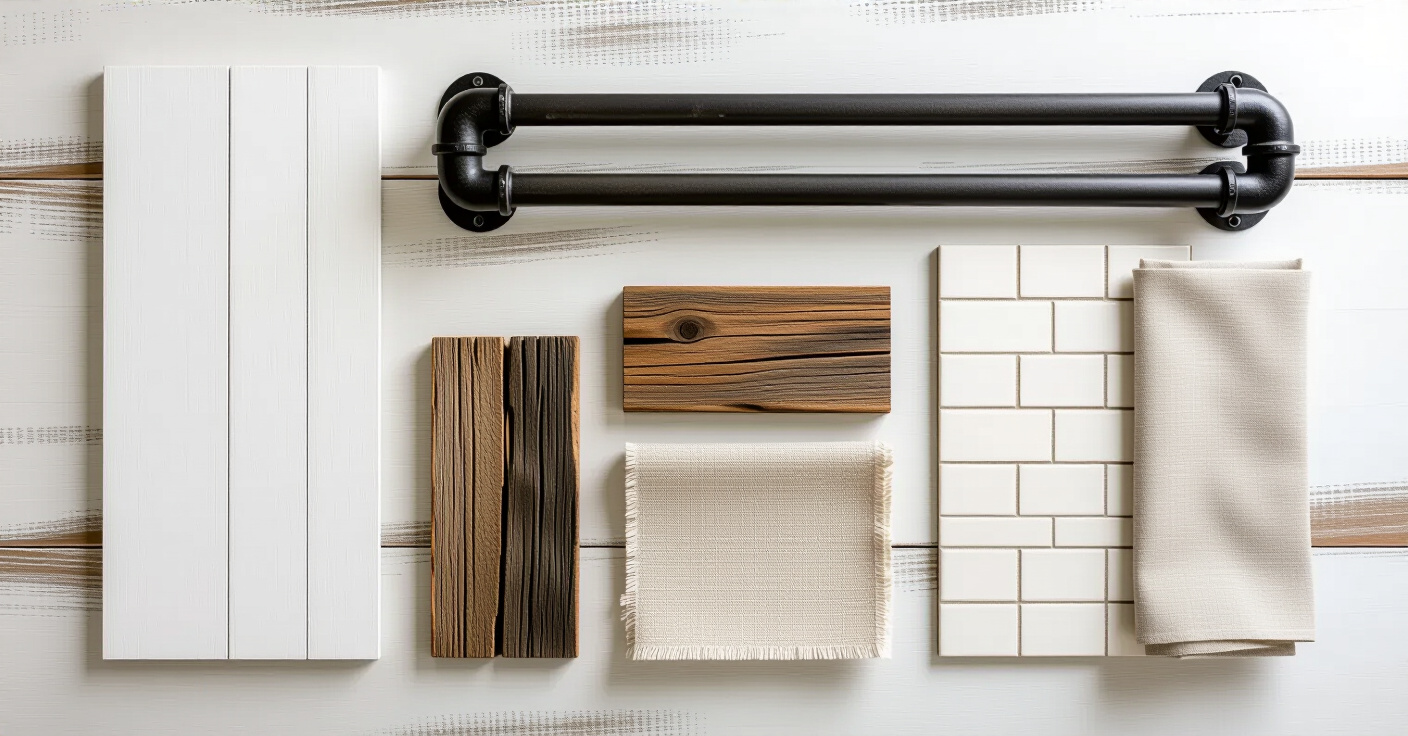
Discover 20 kid-friendly farmhouse bathroom ideas that boost development! Create a stylish, practical retreat for the whole family with these durable & calming tips.
Can we talk for a minute about why everyone gets kids’ bathrooms so wrong? I walk into so many homes, and it’s like a cartoon character sneezed primary colors and plastic all over the walls. It’s loud, it’s chaotic, and honestly, it’s completely overstimulating for a little one’s developing brain. We forget that the bathroom is one of a child’s very first classrooms. It’s where they learn independence—mastering the potty, washing their hands, brushing their teeth. It’s a sensory lab for water play and a quiet space for winding down before bed.
The truth is, a great family bathroom doesn’t need to scream “kid.” It needs to whisper “calm, capable, and clean.” And that, my friends, is where the magic of farmhouse design comes in. It’s built on a foundation of simplicity, natural textures, and rock-solid functionality. It’s durable enough to handle splash-a-thons and stylish enough for you to enjoy after the little ones are asleep. Forget the noise. What really matters is creating a space that nurtures growth, and I’m going to show you how these beautiful farmhouse bathroom ideas do exactly that.
Before you even think about picking out a faucet, we have to talk about the blueprint. This is the part everyone wants to skip, but I promise you, getting this right saves so much heartache (and money!) later. Think of it like setting up a playroom—you wouldn’t just throw toys in a pile, right? You’d create zones for quiet reading and zones for messy art. It’s the same idea here. We’re creating a space that feels intentional, calm, and ready for everything family life throws at it.
Okay, you know when people ask me about farmhouse style? They think it’s just one thing: shiplap and mason jars. But that’s like saying all kids’ books are picture books. There’s a whole library out there! You’ve got your clean and simple Modern Farmhouse, which is fantastic for creating a calm, uncluttered vibe. Then there’s Classic Farmhouse, which feels like a warm hug, full of timeless details. And you might even love Industrial Farmhouse, with cool metal touches that are practically indestructible—perfect for little ones.
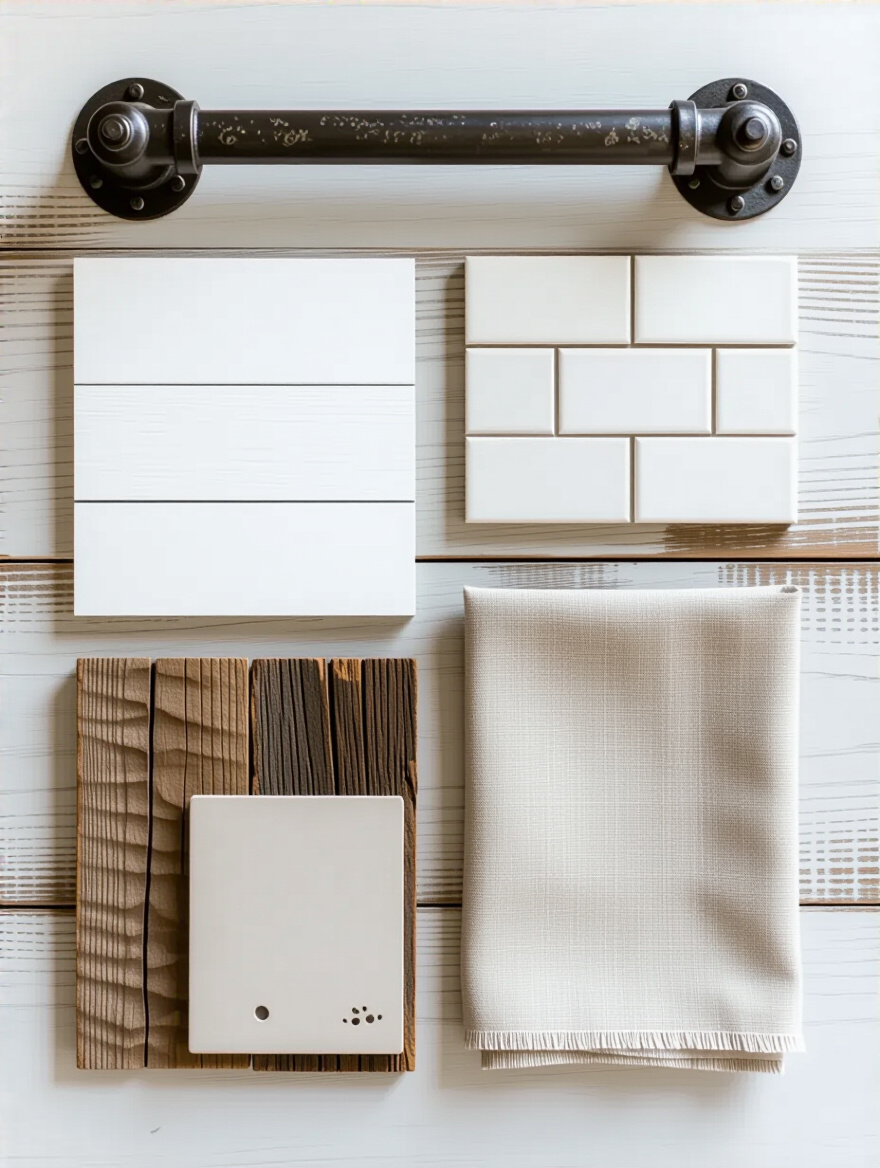
Before you buy a single thing, you have to decide which story you want to tell. The biggest mistake I see is when parents try to do it all, and the room ends up feeling confusing and chaotic. A child’s brain craves consistency and order—it helps them make sense of the world. By picking one lane, you create a visual language for the room that’s calming and easy to understand. Go on Pinterest and make a board, but be ruthless. Ask yourself, “Does this feel like our family?” That’s your filter. Everything else is just noise.
I once had a client who was about to cover up this gorgeous, old, original beadboard in her bathroom because she thought it was “dated.” I practically threw myself in front of the drywaller! Your home’s quirks are its superpowers, especially in a family bathroom. That weirdly placed window? It’s now the perfect sunny spot for a plant that teaches your child about nature. That clunky old radiator? Paint it a fun, muted color and it becomes a charming feature instead of an eyesore.
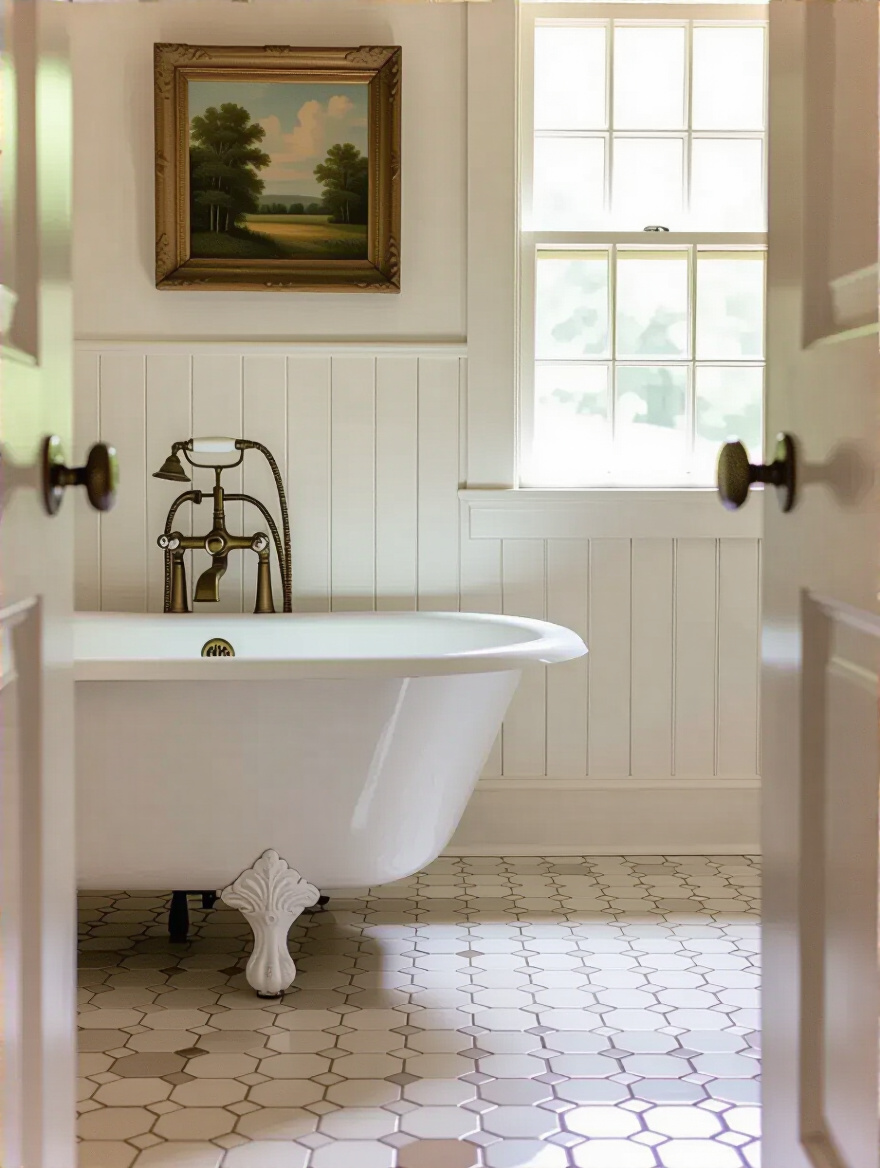
Before you tear anything out, just stop and look. What story is your house already telling you? Working with your home’s bones, instead of against them, creates a space that feels authentic and loved, not like a sterile showroom. From a child’s perspective, these little details add magic and history to their environment. It gives them things to be curious about. Plus, let’s be real—keeping original features is way cheaper than starting from scratch, and that means more money for that amazing clawfoot tub you’ve been dreaming of.
The single biggest factor in creating a calming space for a child is color. Our brains are hardwired to interpret color as information, and for a little one, bright, saturated colors can feel like shouting. Everyone says kids need bright colors to be stimulated, but what they really need is a peaceful backdrop so they can be the focus of the action. That’s why the classic farmhouse palette of warm whites, soft grays, and muted greens or blues is pure genius for a family bathroom.
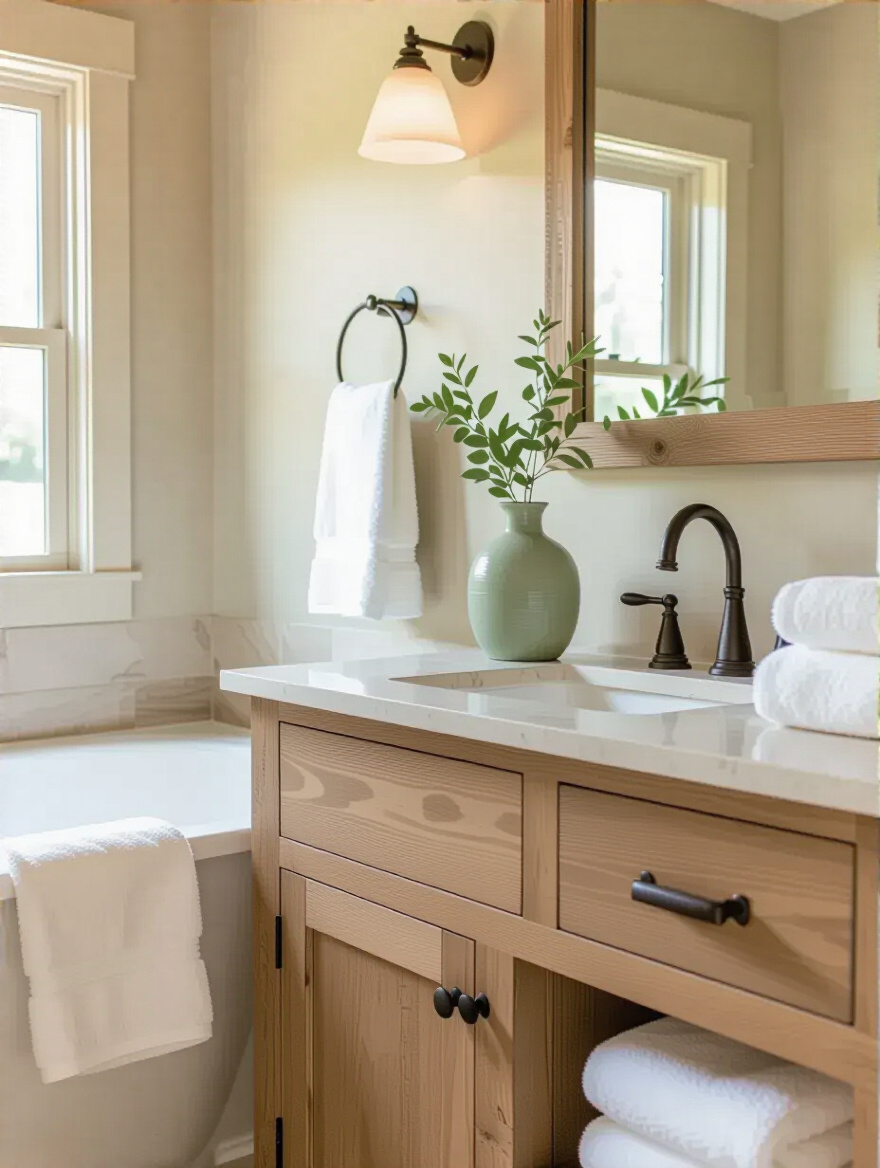
Think of your main wall color—a creamy white or a gentle greige—as the “quiet hands” of the room. It should take up about 60% of the space. This creates a sense of openness and tranquility, which is exactly what you want during a chaotic pre-bedtime routine. Then, bring in a secondary, slightly deeper color for about 30% of the space—maybe on the vanity or in the towels. Save the “pops” of fun for the last 10% with things like a bath mat or a cute soap dispenser. This 60-30-10 rule is the shortcut to a room that feels balanced and intentional, not accidental.
Let’s get real about money. I used to think I could just “wing it” on projects. Then I ended up with a half-finished room and a maxed-out credit card. Lesson learned. The key to budgeting for a family-friendly farmhouse bathroom is to decide where your “hero” pieces are. These are the items that have the biggest impact and need to withstand the most wear and tear. For a family, that’s almost always the vanity and the flooring.
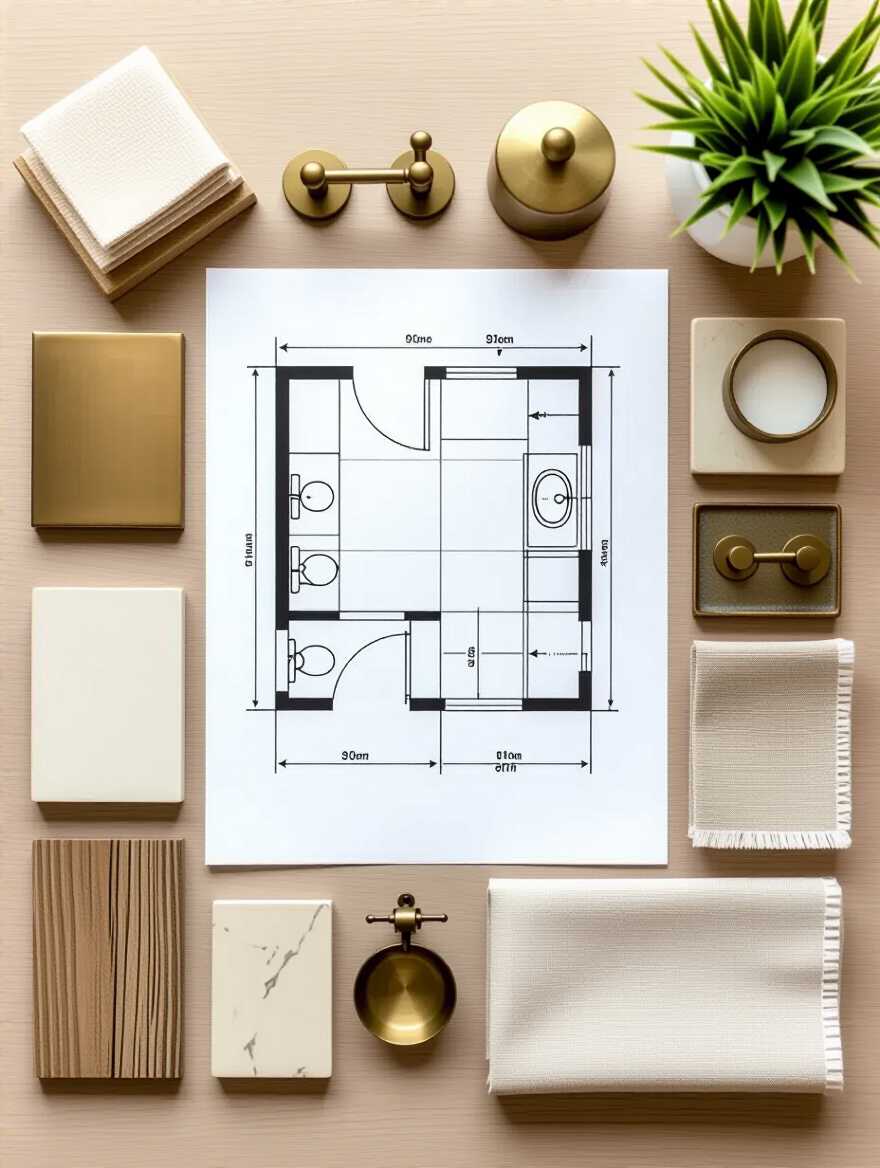
Don’t waste your money on a super-expensive shower curtain that’s going to get splashed with soap and eventually get replaced. Instead, invest that money in a solid wood vanity that won’t fall apart when a toddler inevitably hangs off the drawers. Or put it toward durable flooring with lots of grout lines for grip, which will save you from slip-and-fall scares. The secret is to splurge where it impacts safety and longevity, and save on the decorative stuff you can find at Target or on Etsy. And always, always add 15% to your final number for the “oops” fund. You’ll thank me later.
So we’ve dreamed up the vibe and figured out the budget. Now comes the part that feels like a puzzle, and it’s my favorite: making sure the room actually works for a busy family. A beautiful bathroom is useless if you’re constantly tripping over a poorly placed trash can or can’t open a drawer all the way. This is where we ensure that your charming retreat is also an efficient, frustration-free machine for daily life.
You know what people always ask me? “Do I really need to draw it out?” Yes. A thousand times, yes. Taking ten minutes to sketch your layout on a piece of paper can save you thousands of dollars. I learned this the hard way when I designed a gorgeous bathroom for a family, only to realize on installation day that the vanity drawer couldn’t open all the way because it hit the door frame. The parents had to wiggle it open just to get a toothbrush. It was a beautiful disaster.
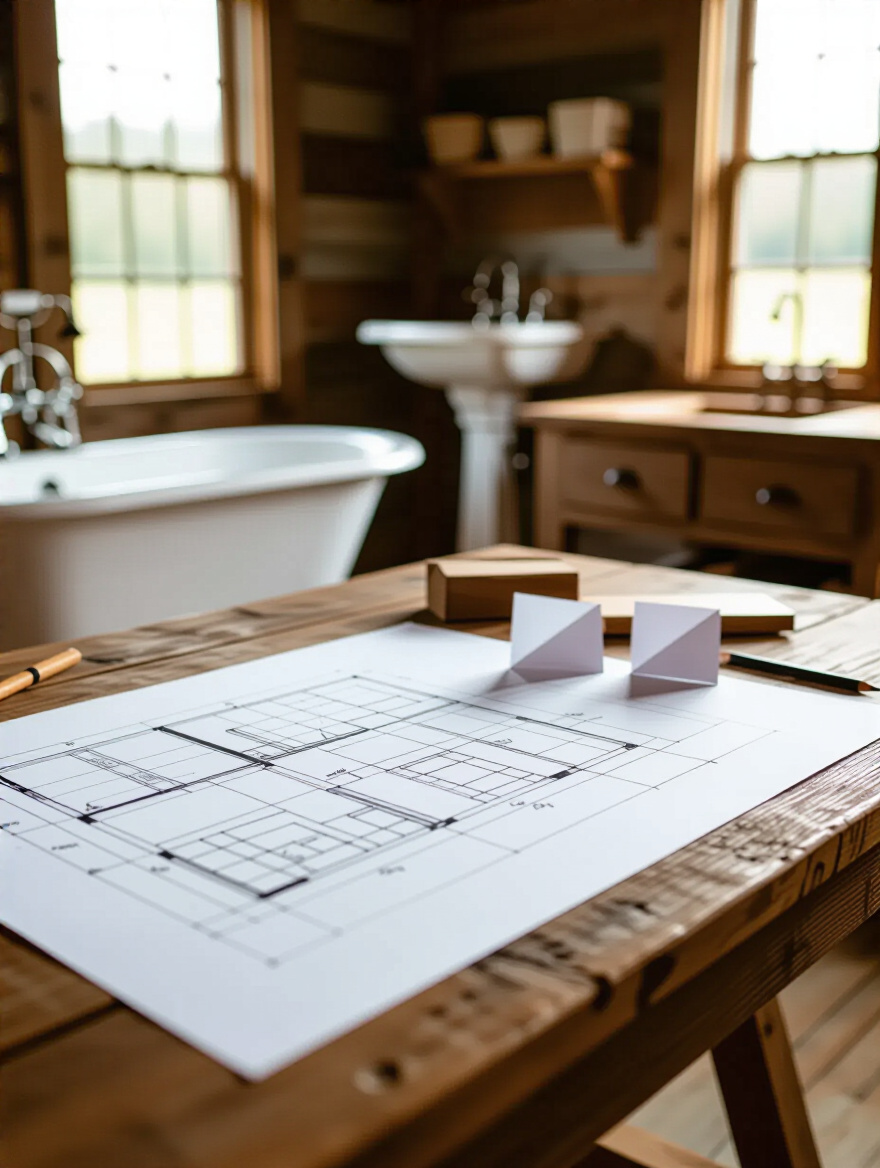
When you’re designing for kids, flow and accessibility are everything. You need a clear pathway from the tub to the towel hook. You need enough floor space for a potty-training stool and a parent kneeling beside the tub. Draw your main pieces—the tub, toilet, and vanity—and then literally trace the path you’d walk with a pencil. Is it a clear shot? Or are you weaving around corners? Thinking about this now prevents a daily dance of frustration later. A happy bathroom is one where movement is easy and intuitive for everyone, big and small.
Alright, the foundation is solid. Now it’s time for the fun stuff—the elements that make your bathroom scream “farmhouse charm!” These are the building blocks that will bring your vision to life. But it’s not just about looks. For a family space, every single choice needs to be a workhorse. It has to be durable, easy to clean, and safe for your little people.
Shiplap is the darling of farmhouse design for a reason, and it’s secretly a parent’s best friend. Those simple, repeating horizontal lines are incredibly soothing for a child’s brain. Unlike busy wallpaper or distracting tile patterns, the clean geometry of shiplap creates a calm, orderly backdrop. This allows your child’s brain to relax, which is a huge win, especially during the often-frazzled bath and bedtime routine. It provides visual interest without creating visual chaos.
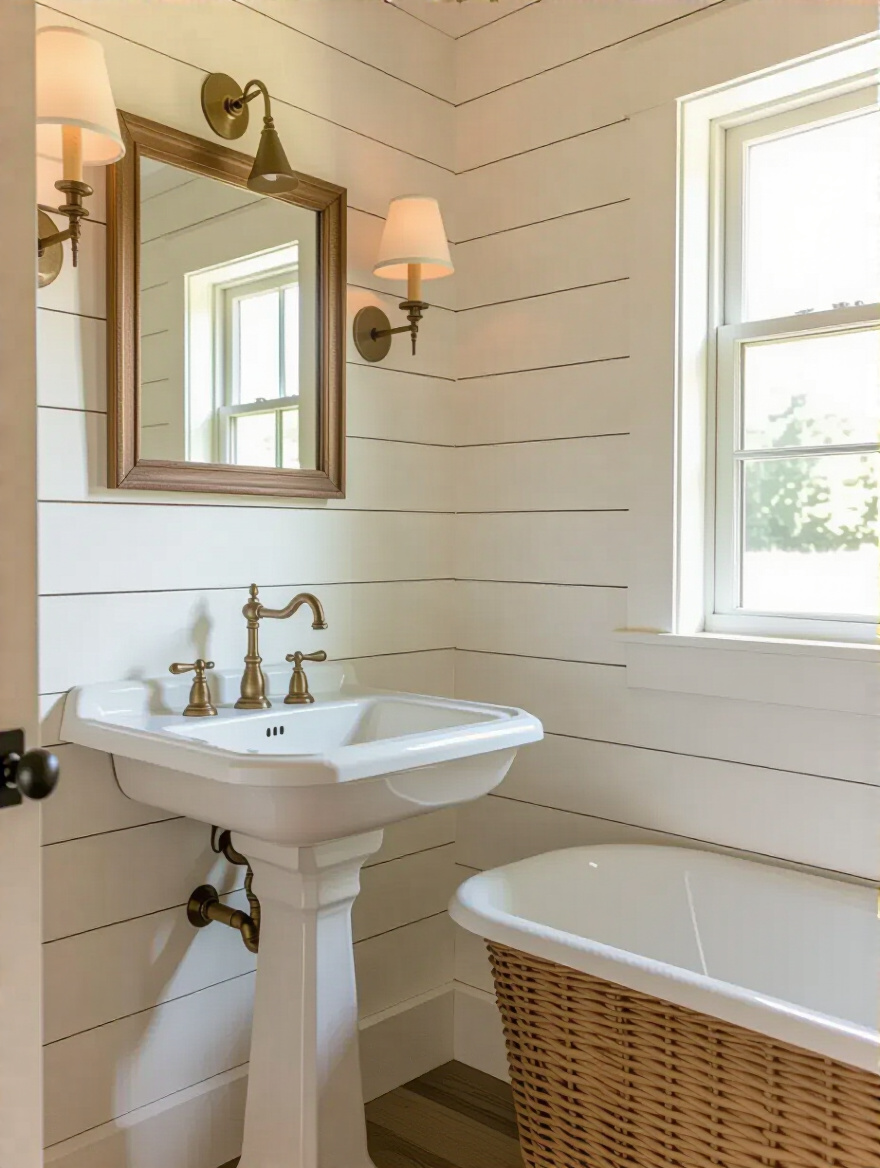
And from a practical standpoint? It’s tough as nails. A semi-gloss paint finish on shiplap makes it completely wipeable—perfect for erasing splatters from toothpaste target practice or sudsy handprints. Forget real wood if you’re worried about moisture. There are amazing PVC and MDF versions now that look incredible and are completely waterproof. I always tell my clients to install it on the main vanity wall as a feature—it gives you that huge farmhouse impact without committing to the whole room.
I know, a built-in tub-and-shower combo seems like the most practical choice. But hear me out. A freestanding or clawfoot tub is actually a developmental wonderland for a child. For one, the sides are lower and there’s no wide ledge to lean over, making it so much easier for you to kneel and help with washing hair or just connecting during bath time. You’re right there with them, not reaching across a vast expanse of tile.
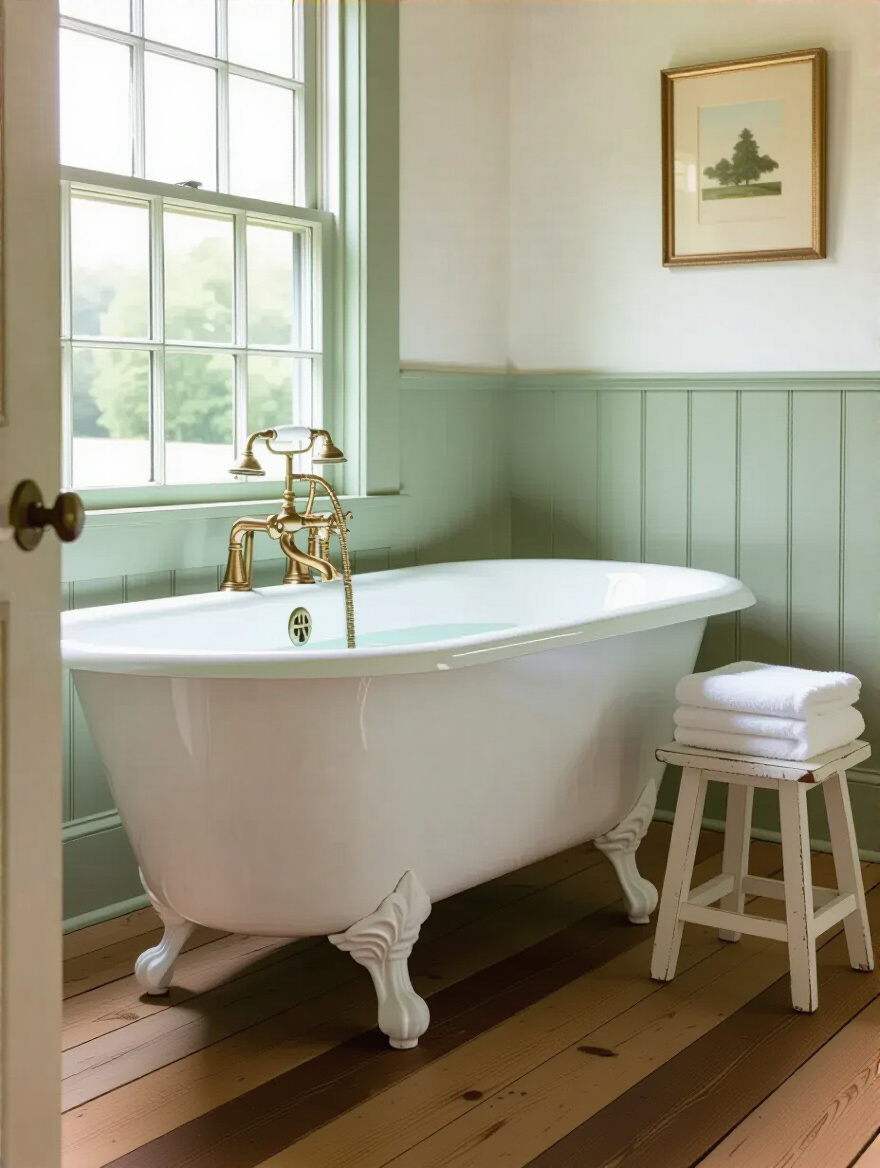
More importantly, it becomes a vessel for imaginative play. It’s not just a tub; it’s a pirate ship sailing the high seas, a cozy nest, or a magical lagoon. By creating a distinct and beautiful object for bathing, you elevate the experience from a chore to an adventure. The best part is, after the kids are in bed, it transforms back into a stunning, spa-like centerpiece for your own grown-up relaxation. It’s a piece that truly serves every single member of the family.
The small details make the biggest difference, and this is especially true with hardware. When you’re choosing faucets and knobs for a family bathroom, think “chunky and easy to grab.” Those delicate, modern levers can be tricky for little, uncoordinated hands. But a classic cross-handle faucet or a simple, sturdy cabinet knob is intuitive and empowering for a child learning to do things for themselves.
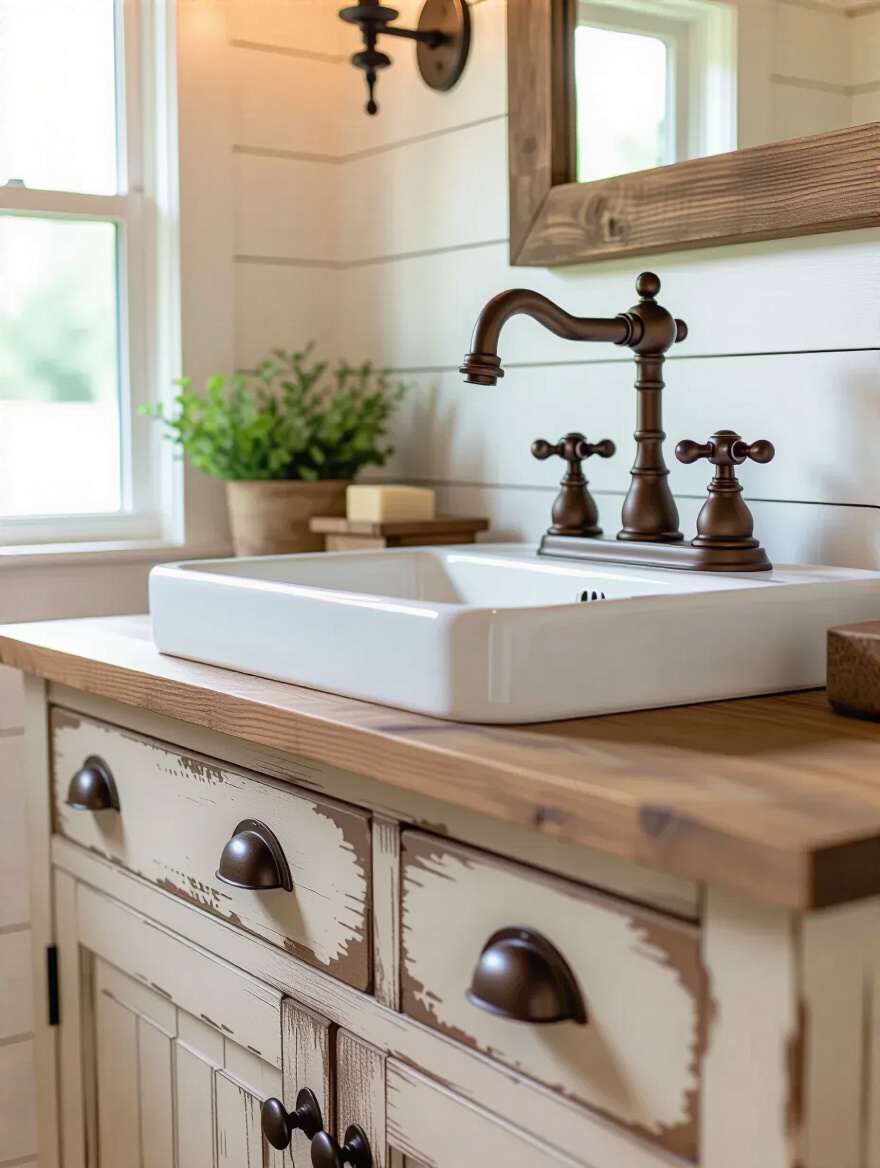
Think about it from a developmental perspective: providing tools a child can successfully operate builds their sense of competence and independence. This is a core principle of Montessori education! Finishes like oil-rubbed bronze or matte black are fantastic because they hide fingerprints and water spots beautifully, meaning less cleaning for you. This isn’t just about looking vintage; it’s about choosing smart, functional pieces that will stand up to years of use and make your kids feel capable.
Clutter is the enemy of calm, and nowhere is that more true than in a bathroom. A vanity isn’t just a place to put a sink; it’s your command center for containing the chaos. I’m a huge fan of vanities that look like repurposed furniture—like an old dresser—because they offer deep, practical drawers instead of a giant, cavernous cabinet where everything gets lost in the back.
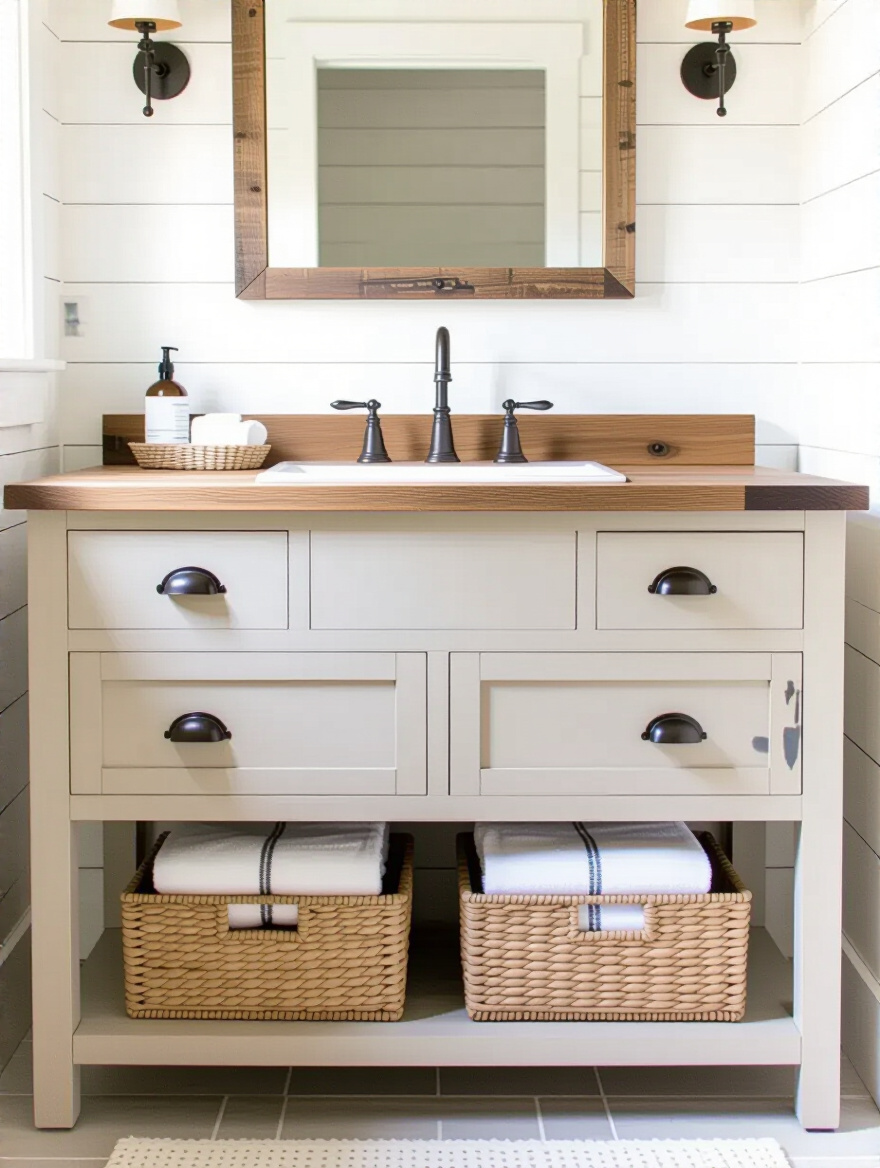
Deep drawers are perfect for teaching kids how to organize. You can use simple dividers to create a spot for their toothbrush, another for their hairbrush, and another for their special bath soap. Giving everything a “home” is the first step in teaching a child how to tidy up after themselves. Plus, having lots of closed storage means you can keep all the grown-up stuff (and cleaning supplies) safely out of sight and out of reach, leaving the countertops clear and serene.
We’ve covered the big, show-stopping pieces. Now let’s talk about the unsung heroes of the bathroom: the surfaces that take the most abuse. The floor your kid turns into a splash park, the sink that has to survive everything from finger paint to muddy hands. These choices are critical for creating a space that’s not just pretty, but truly livable.
Can we just bust the myth that you can’t have wood floors in a bathroom? You totally can, but the shortcut you need to know is wood-look porcelain tile. It gives you that warm, rustic vibe of distressed wood but is completely waterproof and basically indestructible. You can let your kids splash to their hearts’ content, and you’ll never have to worry about warping or water damage. It’s the ultimate design cheat code for parents.
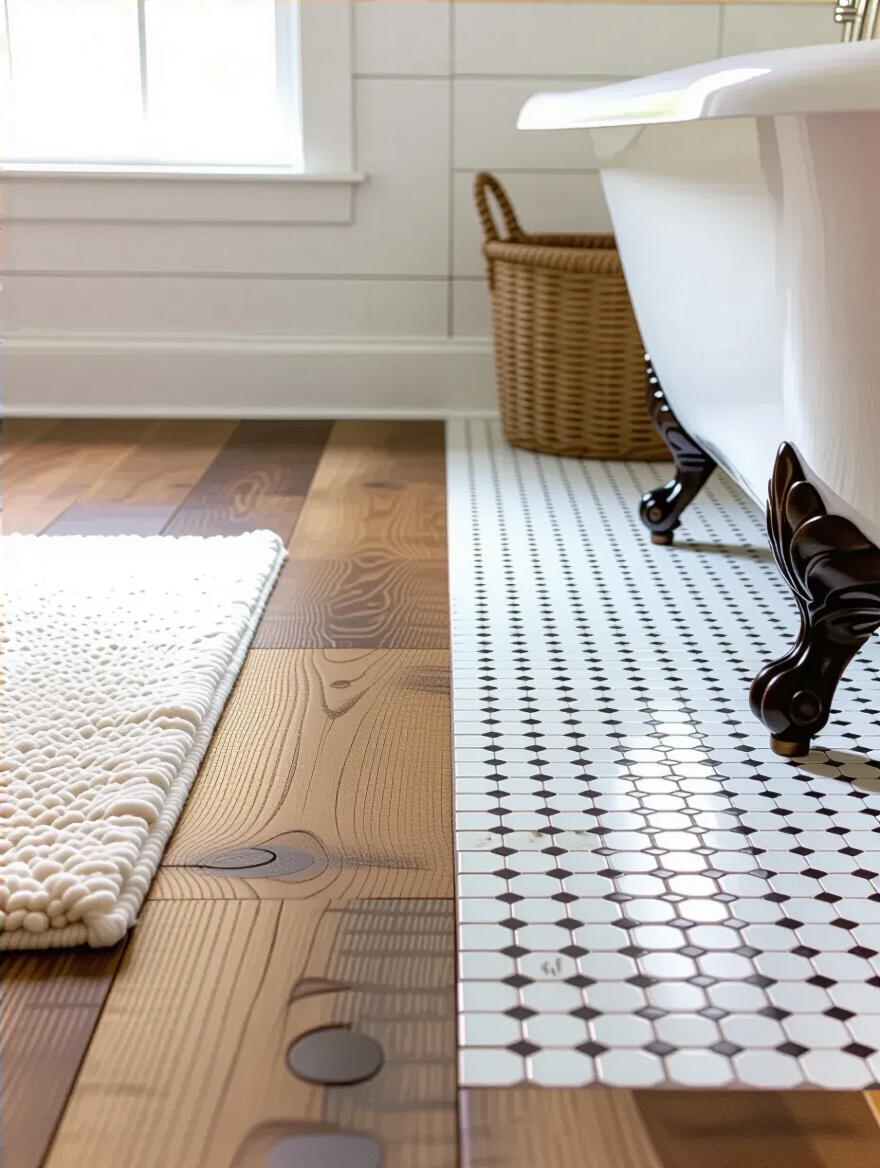
Another fantastic option is classic penny tile. And here’s a little secret from a safety perspective: the more grout lines a tile has, the more grip it provides for wet feet. All those little circles in penny tile create a non-slip surface that’s far safer for wobbly toddlers getting out of the tub than a large, slick tile would be. It delivers vintage farmhouse charm and peace of mind all in one. Safety and style—that’s always the goal.
Now for the personality! The structure is in place, and it’s time to layer in the details that make the space feel like home. These are the elements that bring warmth, texture, and a bit of fun. For kids, these decorative touches are what make a space feel engaging and truly theirs.
Harsh overhead lighting is a sensory nightmare for everyone, especially tired kids at the end of the day. The light in a bathroom should be warm and gentle, like a hug. That’s why I love barn-style sconces mounted on either side of the mirror. This placement casts an even, flattering glow on the face, which is great for you, but it’s also fantastic for a child learning to brush their teeth or wash their face in the mirror. It eliminates weird shadows and makes the task easier.
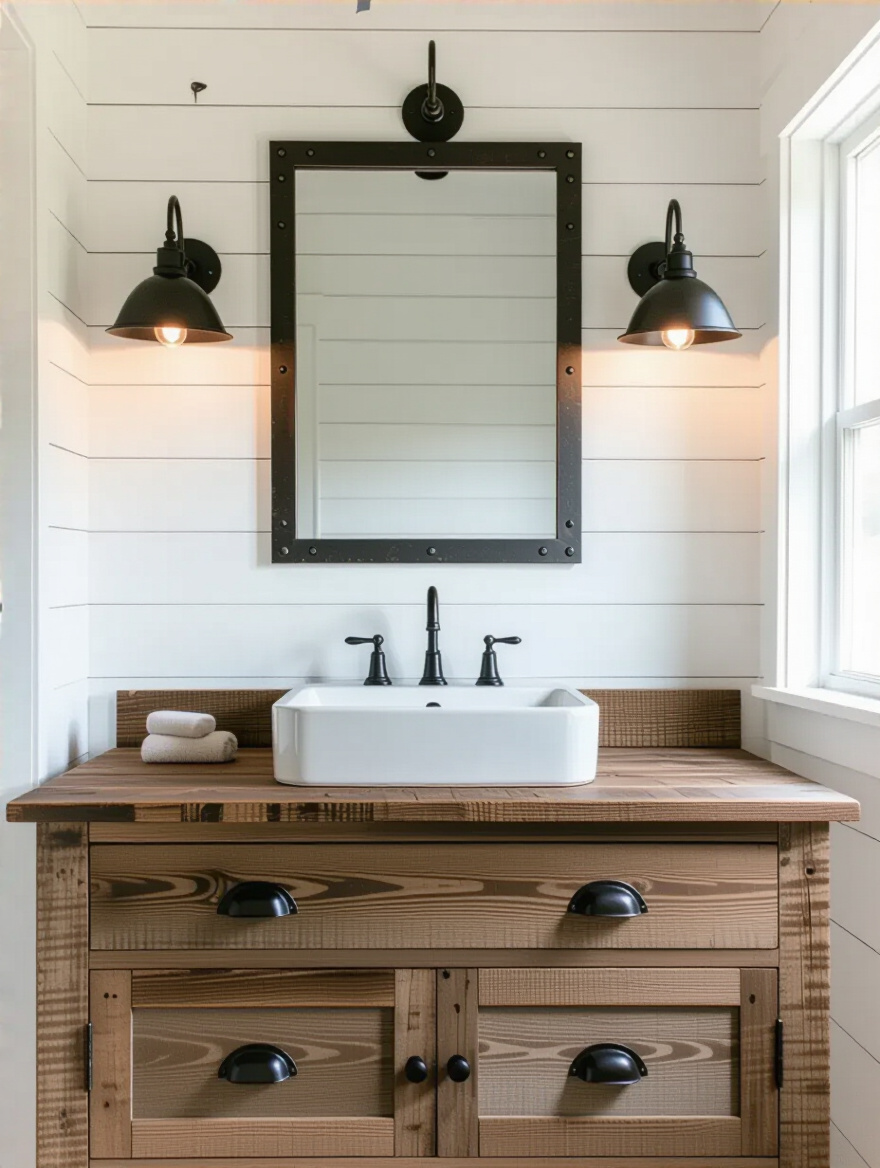
“Lighting isn’t just for seeing; it’s for feeling. Warm, layered light tells a child’s nervous system that it’s time to slow down and prepare for rest.”
For a touch of whimsy, a mason jar fixture can feel so magical to a child—like they’ve captured fireflies in a jar. The key is to put everything on a dimmer switch. This is my non-negotiable for family bathrooms. You can have it bright for morning routines and then dim it way down for a calm, spa-like bath before bed. It’s the single best tool for setting the mood of the room.
A mirror is one of the most important developmental tools in a bathroom. It’s where a child develops their sense of self, makes silly faces, and practices all those new self-care skills. A large, beautiful mirror makes this experience feel important and special. Go as big as you can for the space! It will make the room feel brighter and more expansive, and it also allows for two people (say, a parent and a child) to use it at the same time without bumping heads.
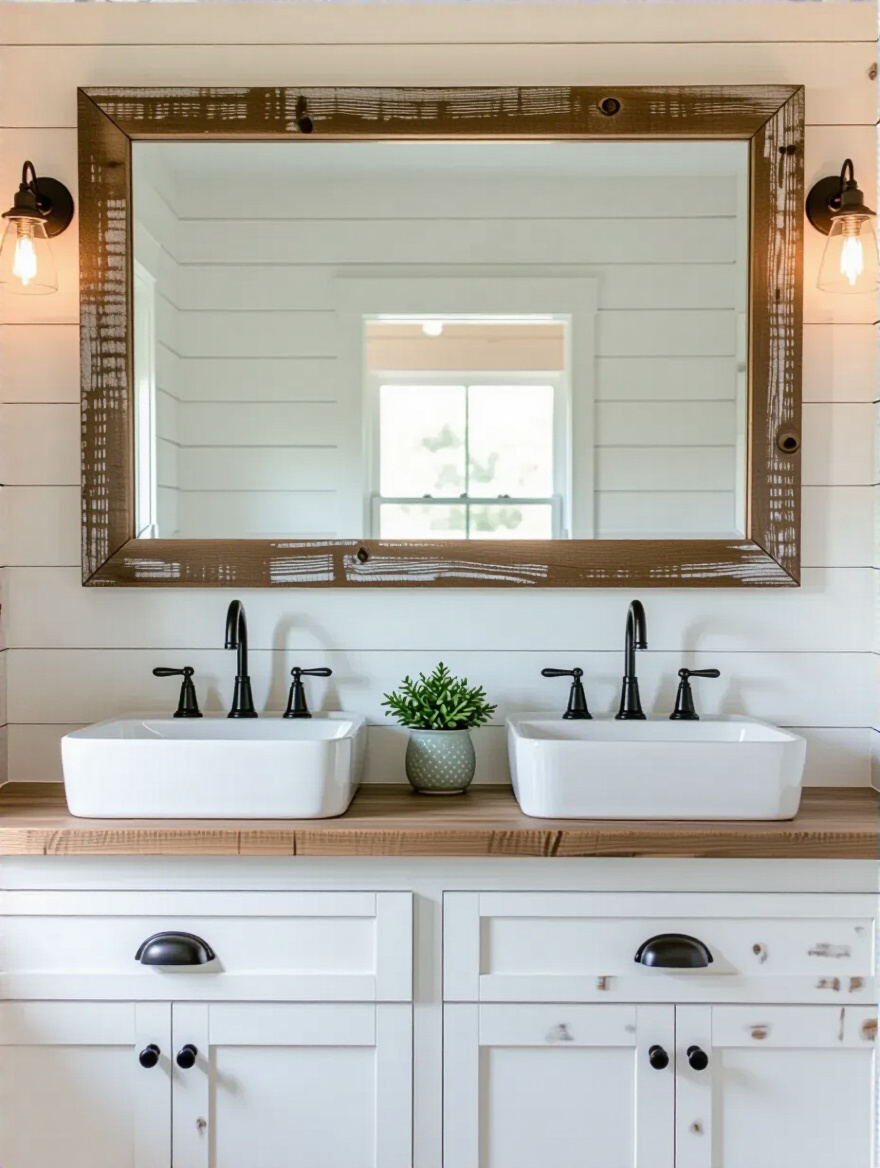
The frame is what gives it that farmhouse feel. A simple, rustic wood frame adds natural warmth, while a dark metal industrial frame is super durable and adds a cool, modern edge. This is a place where you can make a huge design impact. Forget those boring, frameless slabs of glass. A mirror with a substantial frame acts like a piece of art that anchors the whole wall.
Woven baskets are the single greatest organizing tool ever invented for families, period. They are the epitome of Montessori-style, child-led organization. Why? Because kids can see what’s inside, they are light enough for them to carry, and they are practically indestructible. They also add a gorgeous layer of natural texture that instantly warms up all the hard surfaces of a bathroom.
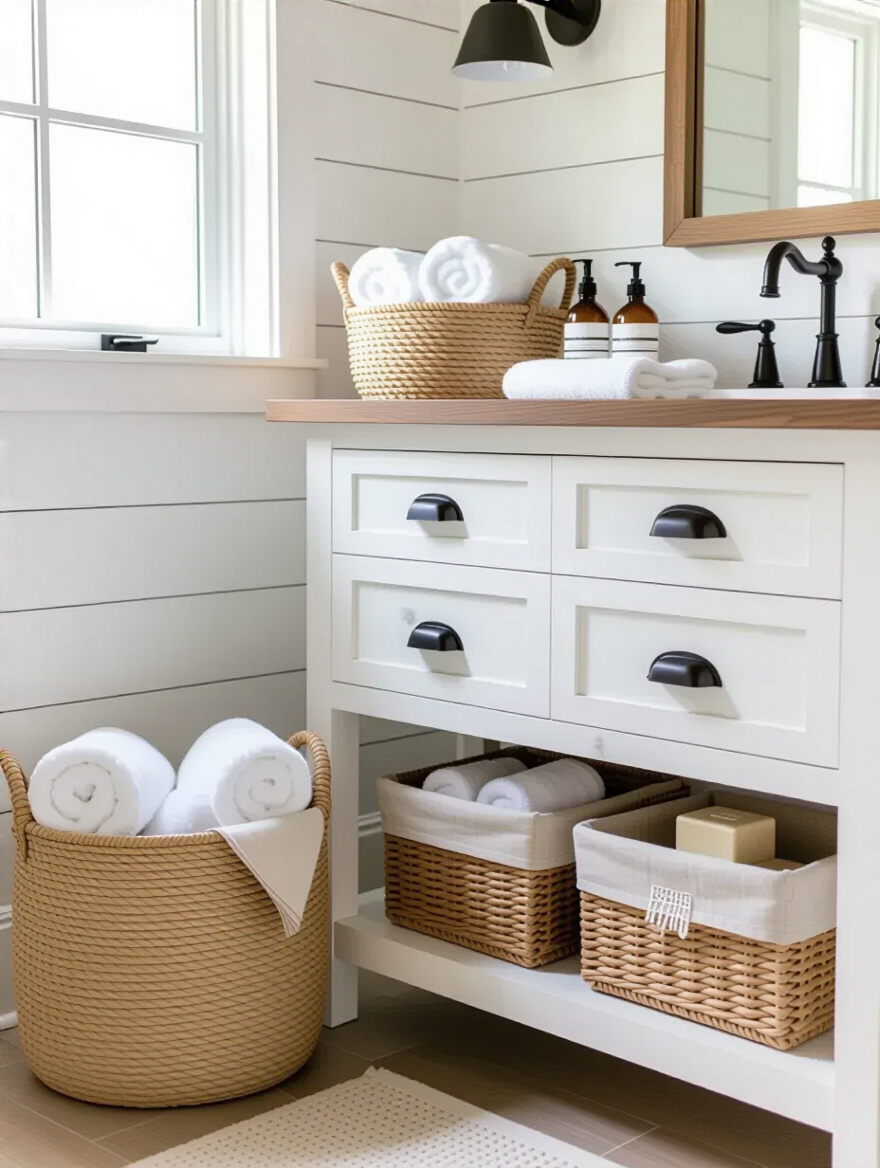
Use a big basket on the floor for bath toys. It’s so much better than a plastic bin because it allows the toys to air dry, preventing mildew. Use smaller baskets on shelves or under the sink for things like washcloths, extra toilet paper, or potty-training supplies. By giving your child accessible storage that they can manage themselves, you are building their confidence and teaching them the life skill of tidiness in the most natural, stress-free way possible.
Bringing a touch of nature indoors has a proven calming effect on our nervous systems. For a child, having a living plant in the bathroom can be a wonderful first lesson in nurturing and responsibility. Pick something that loves humidity, like a fern or a pothos, and put your child in charge of spritzing it with water once a week. It connects them to the natural world and makes the bathroom feel alive and fresh.
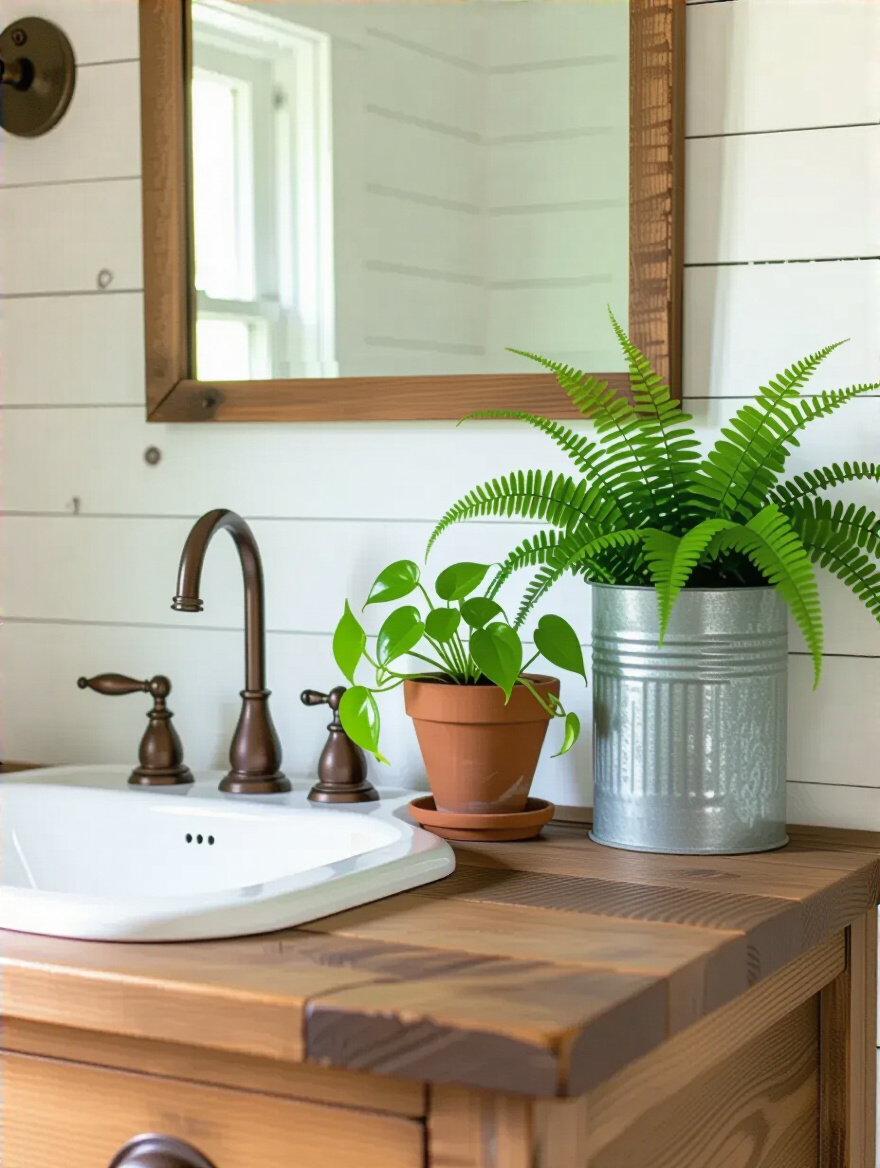
If you don’t have a green thumb, don’t sweat it. High-quality faux botanicals are amazing these days and give you the same visual benefit without any of the work. A simple eucalyptus branch in a vase on the counter or a small faux succulent on a shelf is all you need. It breaks up the straight lines of the room, adds a touch of organic beauty, and reinforces that connection to nature that is so central to the farmhouse ethos.
We’re in the home stretch! This is all about the soft touches. The textiles in a room are like the final layer of clothing—they provide comfort, personality, and an extra bit of coziness. In a room full of tile and porcelain, textiles are essential for making it feel warm and welcoming.
The fastest, easiest way to inject farmhouse style into any bathroom is with textiles. A simple black-and-white (or navy-and-white) gingham shower curtain is iconic. The pattern is simple enough that it doesn’t overwhelm the eye, but it provides a classic, cheerful charm that feels both playful and timeless. It’s a pattern that feels nostalgic to adults and fun to kids—a true win-win.
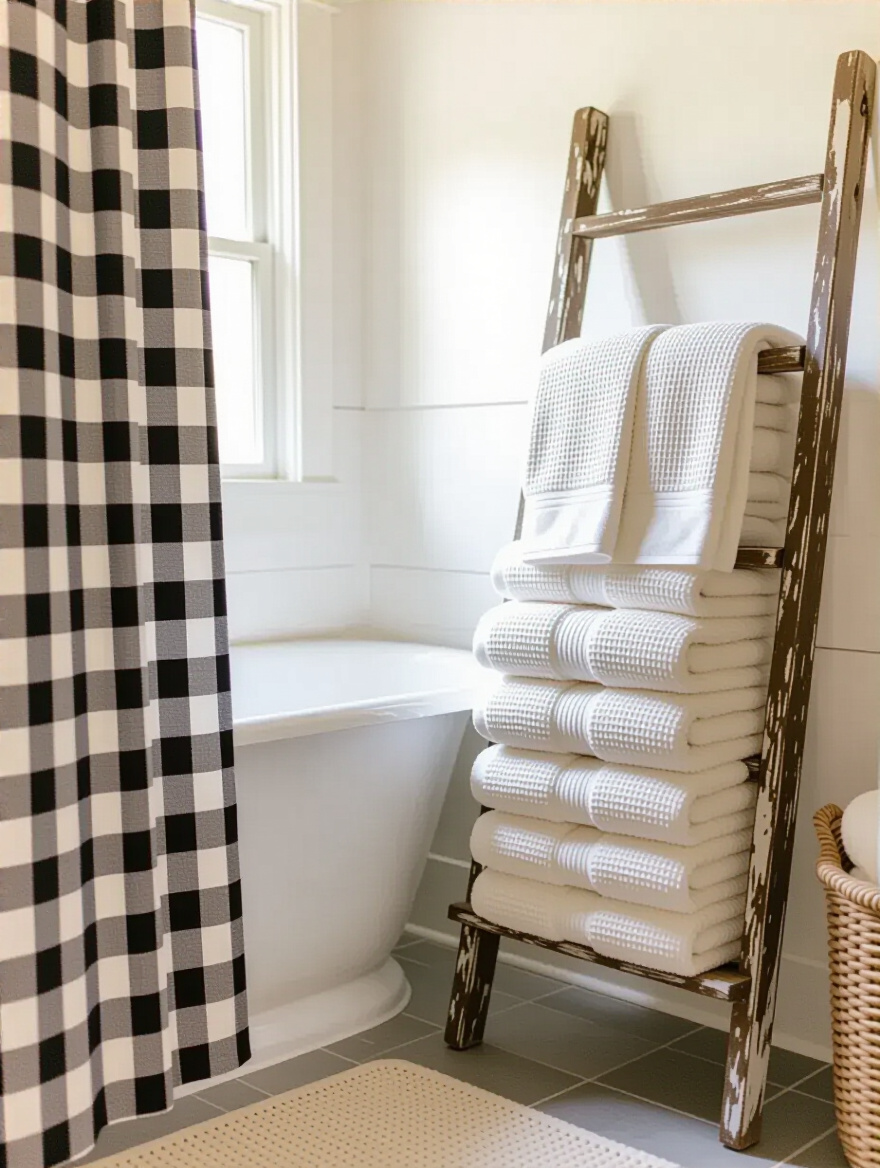
Then, layer in some waffle weave towels. The texture is the key here. From a sensory perspective, the bumpy texture of a waffle weave towel is so interesting for a child. It also happens to be incredibly absorbent and quick-drying, which is a huge practical bonus in a humid bathroom. Stick to solid, neutral colors for your towels to let the shower curtain be the star. This combo is a no-fail recipe for instant farmhouse coziness.
Let’s talk about the clever little details that make a room work smarter, not harder. These are the functional hacks that will make you fall in love with your bathroom every single day because they solve real-life family problems in a beautiful way.
Open shelving can be terrifying for parents—we just imagine more surfaces to collect clutter! But here’s the secret: use it for things that are both beautiful and functional. This is a perfect place for those woven baskets we talked about, or for neatly rolled towels that are easy for kids to grab after a bath. By keeping only the essentials on display, you teach your child the value of “a place for everything, and everything in its place.”
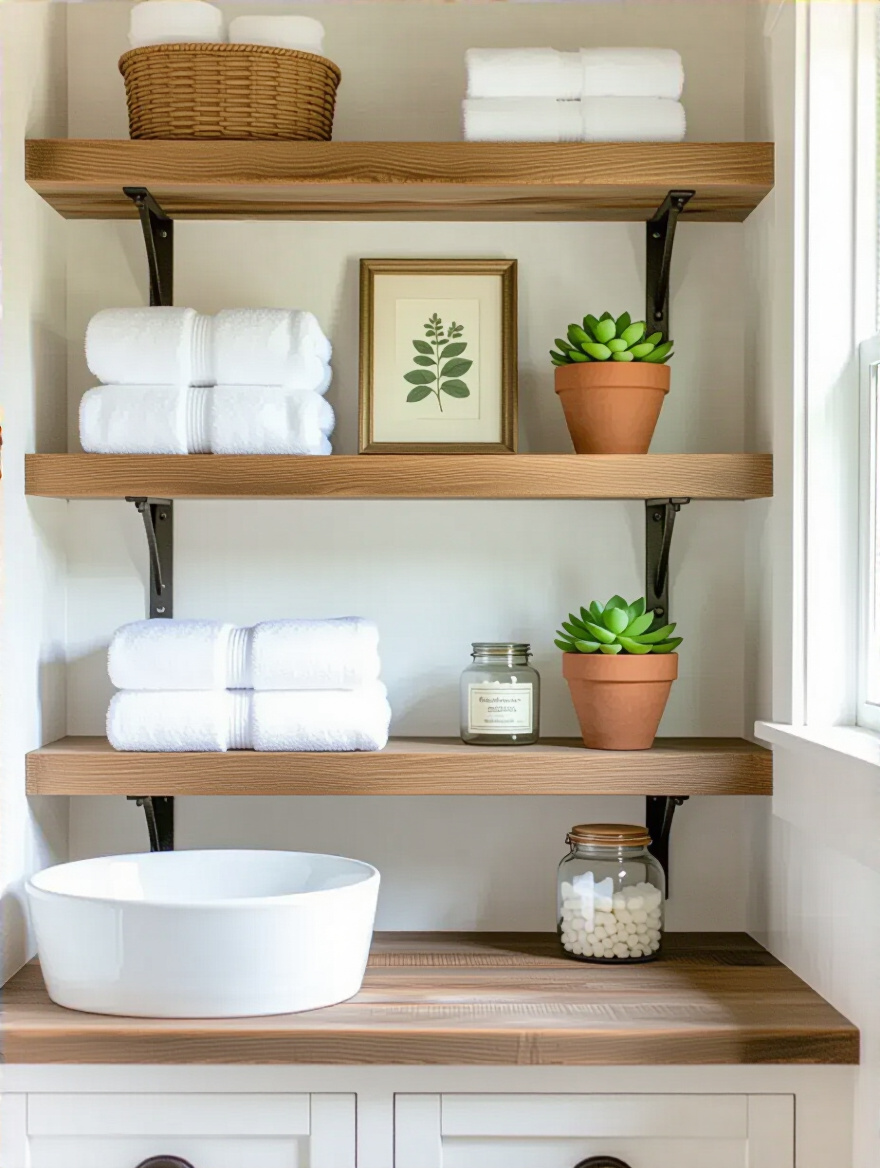
You can also use a small portion of the shelf for a little bit of curated decor. Maybe it’s a vintage rubber duck, a beautiful bar of soap in a rustic dish, or a small framed piece of your child’s artwork. This shows your child that you value beauty and order, and it models how to create a space that feels personal and cared for. Just keep it simple—less is definitely more.
I am a huge believer in giving old furniture a second chance, and a farmhouse bathroom is the perfect place to do it. An old wooden bench can become a spot to sit and dry off or a step-stool to reach the sink. A vintage medicine cabinet found at a flea market can add so much more character than a new one from a big-box store. These pieces bring a sense of history and soul to a room.
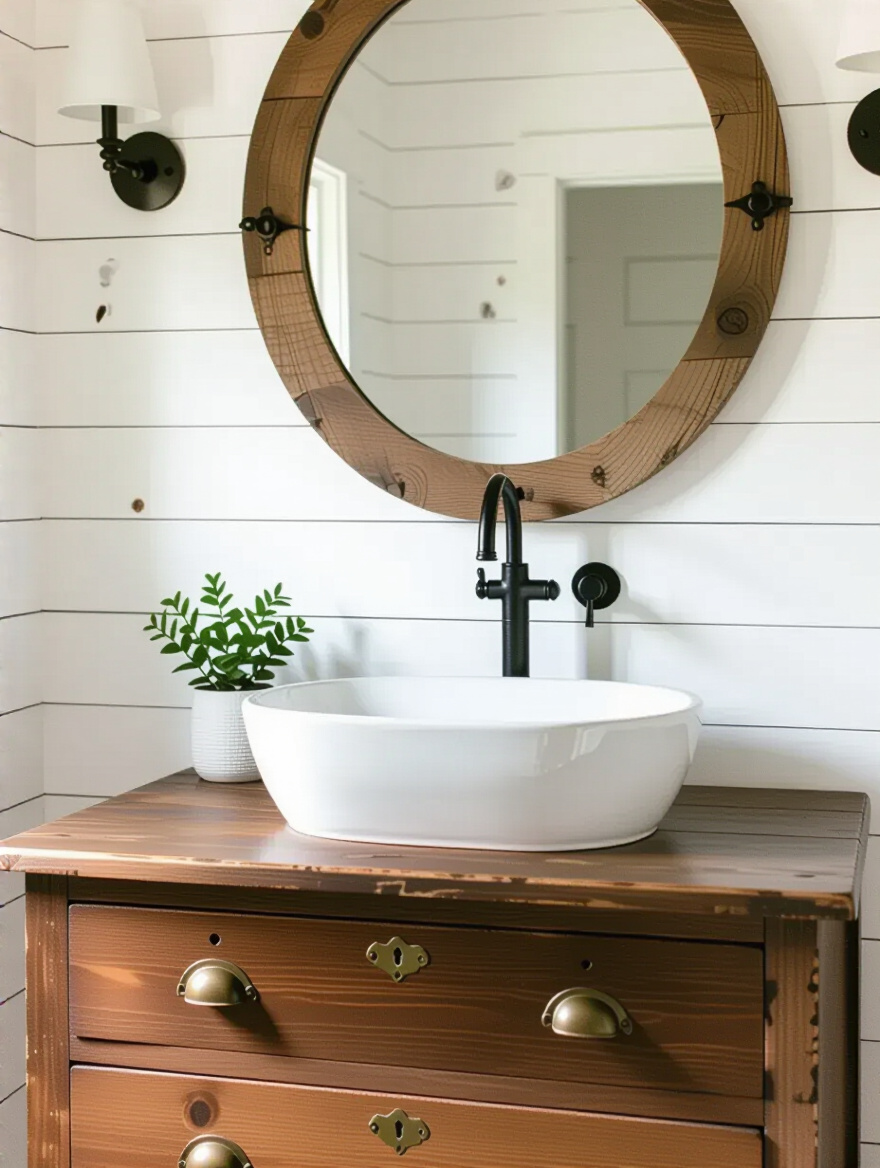
For a child, furniture with a story is endlessly fascinating. You can tell them, “This little stool used to be in a farmer’s barn,” and it sparks their imagination. These unique finds are what keep your farmhouse bathroom from looking like a catalog replica. They make it uniquely yours. Just be sure to properly seal any wood pieces with a marine-grade varnish to protect them from the bathroom’s humidity.
Okay, if you have a small bathroom, a sliding barn door is a complete game-changer. A traditional swing door eats up a ton of precious floor space—space that could be used for a hamper, a step-stool, or just more room to move. A barn door slides along the wall, freeing up that entire footprint. In a tight family bathroom where multiple people are often trying to get ready at once, this can make a world of difference.
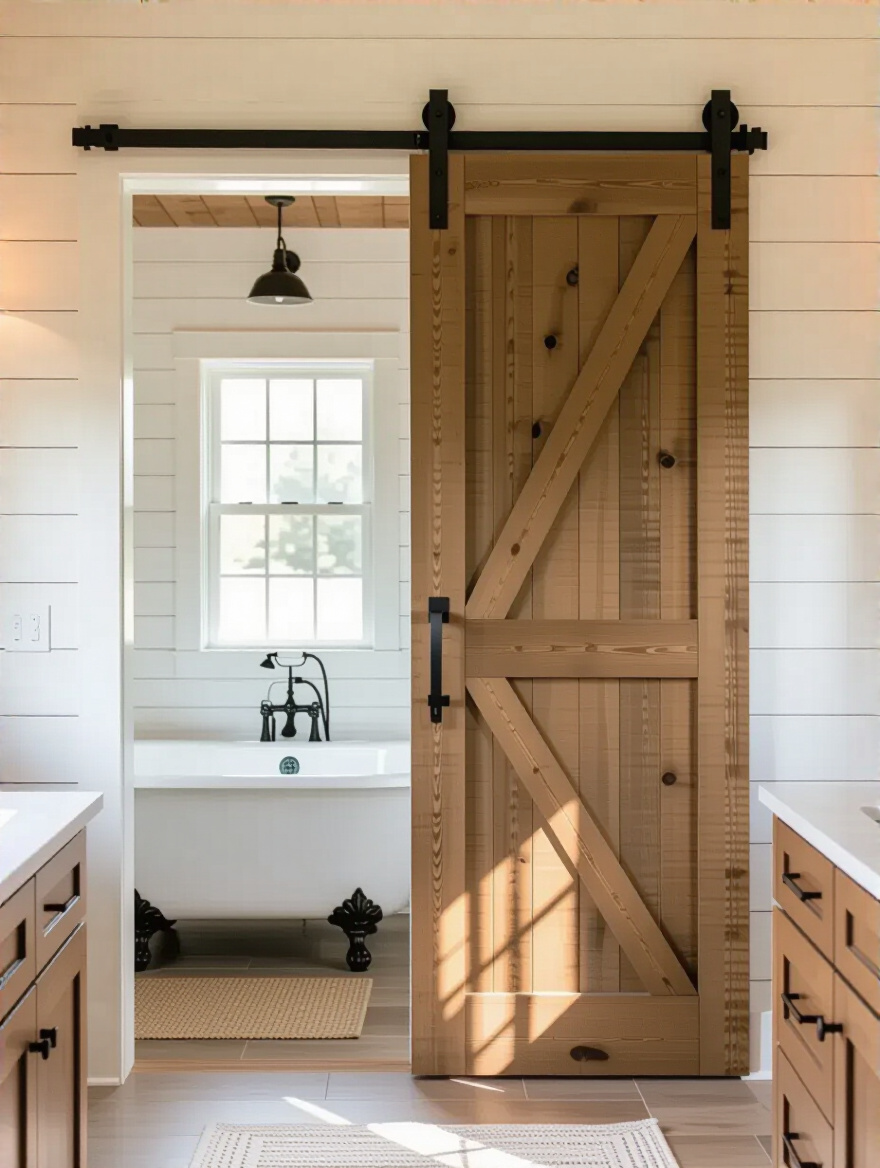
From a design perspective, it’s a massive style statement. It instantly adds architectural interest and that quintessential farmhouse character. Plus, kids just think they are cool. The sliding motion is fun and different. Just be sure to choose a sturdy one and consider a soft-close mechanism to avoid any pinched fingers and loud slams.
Smart storage is about more than just hiding your stuff; it’s about making your daily routine easier. Think vertically! Use the space above the toilet for shelving. Use the back of the door for hooks at different heights—a low one for your child’s towel so they can hang it up themselves, and higher ones for adult robes. Building in these opportunities for self-sufficiency is so empowering for kids.
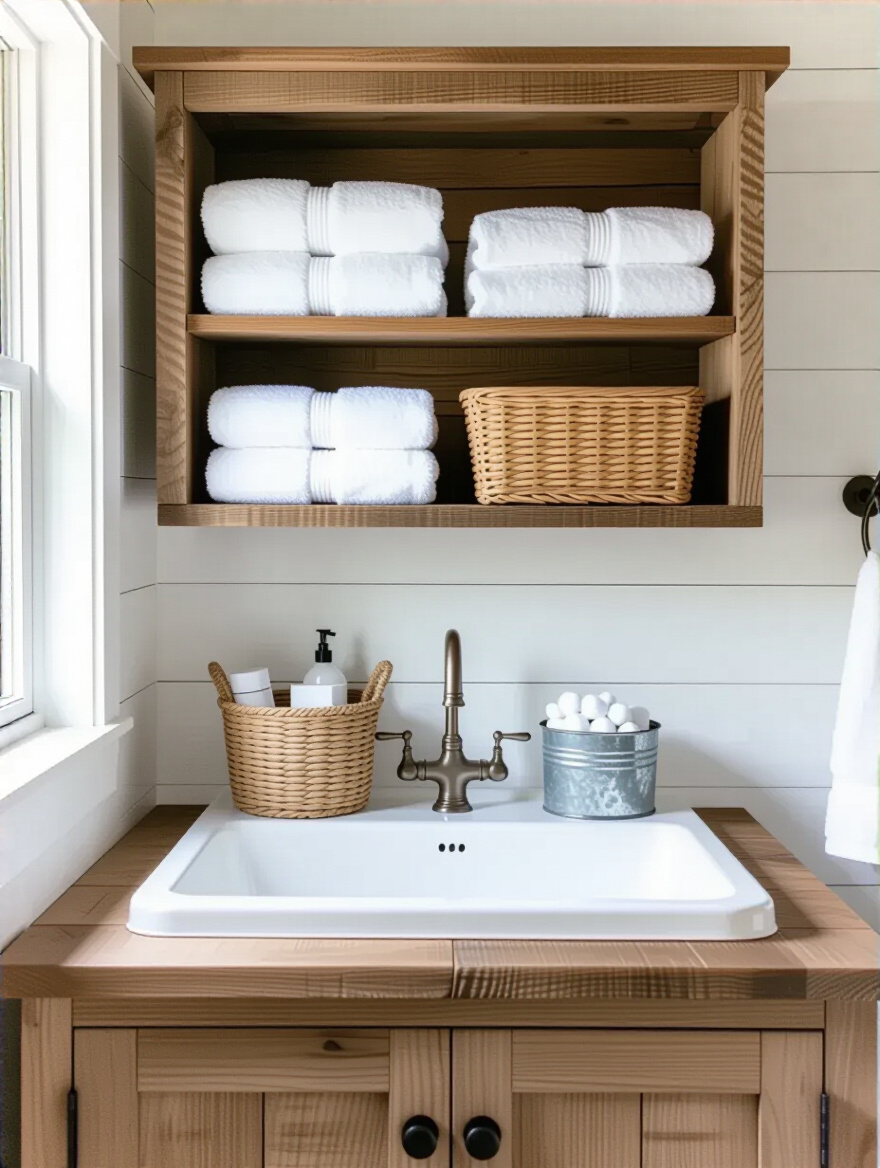
Inside drawers and cabinets, use dividers for everything. There’s nothing worse than digging through a jumbled drawer for a hair tie when you’re trying to get out the door. Simple, inexpensive drawer organizers are your best friend. They create a calm, orderly system that saves your sanity and teaches your kids where things belong. A decluttered bathroom leads to a decluttered mind for the whole family.
We’ve designed a beautiful, functional space. But let’s take it one step further. A truly thoughtful design considers its impact on our world and our well-being. This final touch is about making conscious choices that are good for your family and good for the planet.
The farmhouse ethos is fundamentally rooted in a respect for nature and a “waste not, want not” mentality. This is such a beautiful lesson to pass on to our children. Choosing a low-flow toilet or a WaterSense-certified faucet provides a daily, tangible opportunity to talk about water conservation. You can tell your child, “Our special faucet helps save water for the fishes!”
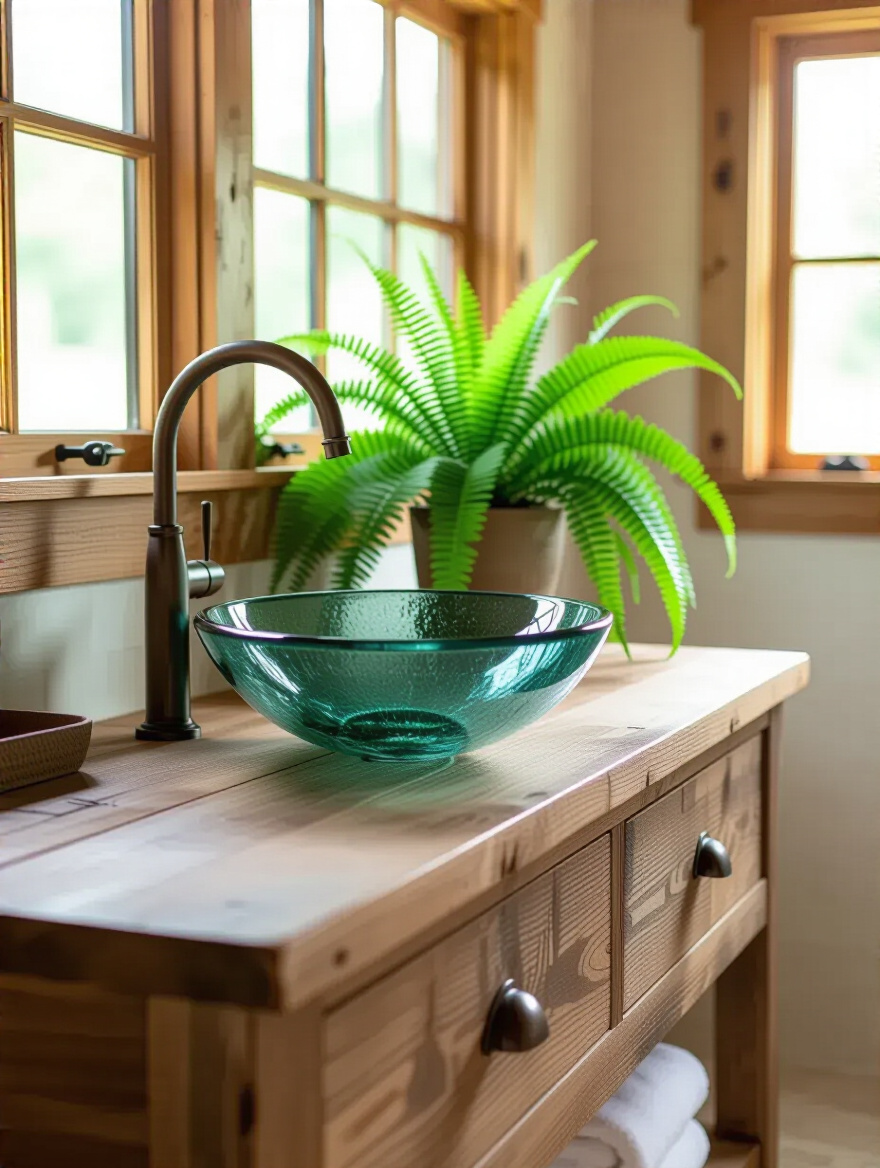
When you’re painting, choose a low- or zero-VOC paint. This is so important for maintaining healthy indoor air quality, especially for little developing lungs. Whenever possible, choose materials that are reclaimed or made from sustainable sources. These choices aren’t just about being “green”; they are about creating a healthy, non-toxic environment for your family to grow in, which is the most important function a room can possibly have.
See? A farmhouse bathroom is so much more than a design trend. It’s a philosophy. It’s about creating a space that is simple, durable, calming, and full of natural warmth—all the things we want our homes to be for our children. By focusing on practical storage, safe materials, and layouts that encourage independence, you’re doing more than just decorating. You are building a beautiful, functional classroom for some of life’s most important early lessons.
So take these ideas and start dreaming. Whether you’re tackling a full renovation or just swapping out your shower curtain and adding a few baskets, every small change can move you toward a space that supports your family’s well-being. You can create a retreat that is stylish enough for you, tough enough for them, and serves as a happy, hardworking hub for your home for years to come. Your perfect family-friendly farmhouse bathroom is waiting!